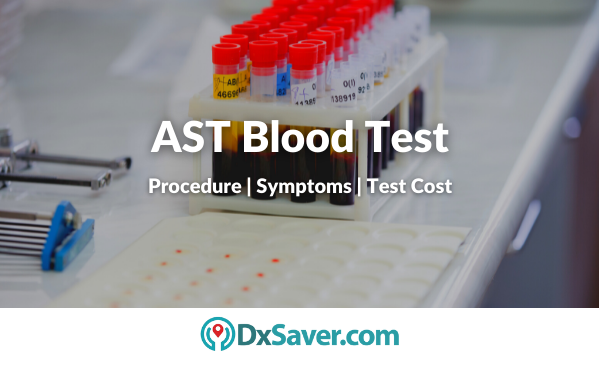
Liver function tests are blood tests that measure the levels of certain enzymes and proteins in the blood. These blood tests help to diagnose and monitor liver disease or damage. The AST blood test is one of the common liver function tests. AST or Aspartate transaminase is an enzyme that helps metabolize amino and exists mostly in the liver and also in numerous tissues in the body.
An AST blood test measures the level of AST in the blood sample and a high level of AST may indicate liver damage, disease, or muscle damage. AST blood test can be done alone. But it is included with other enzymes as part of broader tests like the liver panel or comprehensive metabolic panel (CMP). An AST measurement can help identify liver disease and other health issues when it is interpreted alongside other enzymes.
This article covers all the significant topics related to the AST blood tests such as the test cost, symptoms, risk factors, and how to get tested for an AST blood test.
- What is an AST blood test?
- Why is an AST test done?
- Symptoms of liver damage or disease
- Risk factor
- What happens during an AST test?
- How should you prepare?
- Risk of this test
- What do the results mean?
- What can cause AST levels to rise?
- Other tests
- Provider locations
For our readers who are interested in knowing the AST blood test cost beforehand, we begin with that section.
How much does the AST blood test cost?
AST blood test costs $47 in the US. Prior appointment isn’t required. You can order tests online by comparing the price or visiting the nearest lab during lab business hours. You will get the results in your email in 2 to 3 business days after completing the procedure. Apart from this, doctor consultation is available for any kind of further treatment or medical advice.
The table below shows the AST blood test provider and their prices. You can know more and book the test by clicking on the “Book Now” button.
Name of our Partner Labs | Book Online at Offer Price |
Personal Testing Lab
| $47 |
AST blood test cost with insurance
Many insurance companies in the U.S. cover all the vital tests like an AST blood test. However, the coverage provided by private health insurance companies and national health insurance programs like Medicare varies widely. Most of the health insurance policies cover AST blood test costs only once or twice a year and when your physician orders more than twice in a year, you should pay the test cost out of pocket. So, you are recommended to check if your health insurance policy covers the AST blood test cost.
Our AST blood testing providers do not accept any kind of health insurance policy. However, they can provide you with an itemized receipt containing all the details viz the name of the test, code of the test, and CPT code which is necessary for insurance reimbursement purposes.
What is an AST blood test?
Aspartate aminotransferase or AST is an enzyme that is mostly found in the liver. It is also found in muscles, the heart, kidney, brain, lungs, pancreas, red blood cells, and a small amount in the bloodstream. AST (aspartate aminotransferase) is also known as SGOT (serum glutamic-oxaloacetic transaminase). An AST blood test measures the amount of AST in the blood and can help doctors to diagnose liver damage or disease and to monitor the treatment. When the liver is inflamed or damaged, they release AST into the bloodstream. A higher than normal level of this enzyme in the blood can be a sign of liver damage. However, it can also indicate damage to other organs like the heart or kidneys. So, doctors often order AST blood tests along with tests of other liver enzymes.
AST levels can increase as soon as 6 hours after tissue damage occurs. The normal level for AST is high from birth to age 3 when compared to the normal level for older children & adults.
Why is an AST test done?
Doctors use AST blood tests to check for liver conditions like hepatitis. And can also be used for checking the effectiveness of treatment. In this case, doctors may order it periodically when you undergo treatment. Additionally, doctors use the AST test to make sure the medications a person is taking are not causing liver injury. When the results of the AST blood test suggest liver damage, doctors may need to change the medications or lower the dose.
AST is measured together with alanine aminotransferase (ALT). Abnormal ALT levels are more likely related to liver injury than abnormal AST, according to liver specialists. The problem is more likely because of a heart condition or muscle problem rather than the liver when levels of AST are abnormal and ALT levels are normal. The ratio of AST to ALT may help doctors to determine certain liver diseases.
Symptoms of liver damage or disease
A doctor may order an AST test when a person is having symptoms of liver damage or disease. It may include:
- Dark urine
- Nausea and vomiting
- Diarrhea
- Jaundice
- Loss of appetite
- Stomach pain or swelling
- Weakness
- Extreme tiredness or fatigue
- Light-colored poop
- Unusual itching
- Weight loss
- Swelling or pain in the abdomen
- Swelling in the ankles & legs
- Bruises
- Bleeding difficulties
Risk factor
The health care provider or a doctor may order an AST blood test if you are at a higher risk for liver damage. Certain factors can increase the risk of having liver problems, it may include:
- Heavy alcohol use
- Family history of liver disease
- Exposure or possible exposure to hepatitis virus
- Obesity
- Taking certain medications
- Diabetes

What happens during an AST test?
A healthcare professional or lab tech will take a blood sample from a vein in your arm. To make the vein fill with blood and swell up, they will tie a band around the upper part of the arm. And the health care provider will clean the area with an antiseptic and place a needle into the vein. A small amount of blood will be collected into a vial or test tube after inserting the needle. It is common to feel a quick sting or pinch when the needle goes in/out. After taking the blood, the healthcare professional will remove the needle and band. And they will put a piece of gauze and a bandage over the spot to stop the bleeding. Usually, this test takes only a few minutes.
How should you prepare?
There is no special preparation for an AST blood test. You need to tell the doctor about prescription drugs or over-the-counter medications you take. Because certain medicines can affect the results of this test. However, a doctor or a health care provider will instruct you if there are any special instructions to follow.
Risk of this test
There is little risk in having an AST blood test. You may have slight pain or bruising in the area where the needle was inserted. However, these symptoms go away quickly.
What do the results mean?
The normal value for AST in blood for males is 10 to 40 units/L and in the case of females, it is 9 to 32 units/L. And normal levels differ depending on the sex and age.
Higher-than-normal levels of AST can indicate liver damage, it can also indicate heart problems or pancreatitis. When the results are not normal, it does not certainly mean that you have a medical condition needing treatment.
Doctors will evaluate the results based on their health and other factors. They may take a thorough medical history and perform a physical exam to determine whether other conditions not related to the liver may be causing the abnormalities. Generally, abnormal tests are repeated to ensure the results are accurate and reproducible. Other tests like blood tests, liver imaging, and liver biopsy are typically required to follow up on abnormal AST levels.
What can cause AST levels to rise?
Conditions that cause AST levels to be abnormal may include:
- Cirrhosis
- Chronic hepatitis
- Blockage in the bile ducts
- Blockage in blood flow to the liver
- Liver cancer
- Liver trauma in physical injury
- Autoimmune diseases
- Certain genetic disorders
- Nonalcoholic fatty liver disease (NAFLD)
Other possible reasons for a high AST level that are not related to the liver may include:
- Burns
- Celiac disease
- Abnormal red blood cell destruction
- Heart attack
- Intense exercise
- Muscle injury
- Muscle diseases
- An injection of medicine into your muscle
- Pregnancy
- Pancreatitis
- Seizures
- Surgery
Other tests
Usually, AST is a part of a group of liver function tests (liver panel). AST is often done with an ALT (alanine aminotransferase), another liver enzyme. Comparatively, ALT is more accurate than AST at detecting liver disease. This can show whether the problem is in the liver or another part of the body, like the heart or muscles. By comparing the amount of ALT to AST in the blood doctors can figure out whether you have liver damage or a problem with another organ.
Apart from this, doctors may also perform other tests of enzymes and proteins the liver makes. This includes alkaline phosphatase (ALP), bilirubin, and total protein.
Provider locations
An AST blood test can be done in any of the following locations by visiting the lab near you. To know the AST blood test cost, refer to the first section of the article.
- Alabama
- Alaska
- Arizona
- Arkansas
- California
- Colorado
- Connecticut
- Delaware
- Florida
- Hawaii
- Georgia
- Idaho
- Illinois
- Indiana
- Iowa
- Kansas
- Kentucky
- Louisiana
- Maine
- Michigan
- Minnesota
- Mississippi
- Missouri
- Montana
- Nebraska
- Nevada
- New Hampshire
- New Mexico
- North Carolina
- North Dakota
- Oklahoma
- Oregon
- Pennsylvania
- Puerto Rico
- South Carolina
- South Dakota
- Tennessee
- Texas
- Utah
- Vermont
- Virginia
- Washington
- West Virginia
- Wisconsin
- Wyoming
Frequently Asked Questions
Will insurance cover my testing cost?
No, insurance will not be covered in the billing. However, they will provide you with a receipt for insurance reimbursement purposes.
How should I book my appointment?
You can choose the most suitable provider from above and make an appointment by following the instructions mentioned by them.
Can I cancel my lab test order?
Yes, you can cancel your lab test order any time before your testing. A refund will be initiated after deducting the cancellation fee. However, cancellation is at the discretion of the provider.
Do the providers offer result interpretations?
Yes, a few providers may provide doctor consultation who will take you through the results and provide clarification if needed.
How do I receive my report?
To ensure your privacy, the test report will be mailed to you by the provider.
Other topics you may also be interested in:-
- What is a liver function test or LFT?
- Perimenopause Testing for Women
- What is Rheumatoid Arthritis?
- Importance of Occult in Blood
- What is a Titer Test?
- Symptoms and Signs of Lactose Intolerance
- Dog Allergy Testing Cost in the US
- What is HCT in Blood Tests?
- Fibrinogen Test Cost in the U.S.
- Causes and Symptoms of Zika Virus
- Troponin Testing in the US
- Importance of ACTH Hormone in Blood
- MCV: Normal Levels, Importance and Testing
- What is Ammonia Test?
- Symptoms of Tay-Sachs Disease
- What is the Myasthenia Gravis Test?






